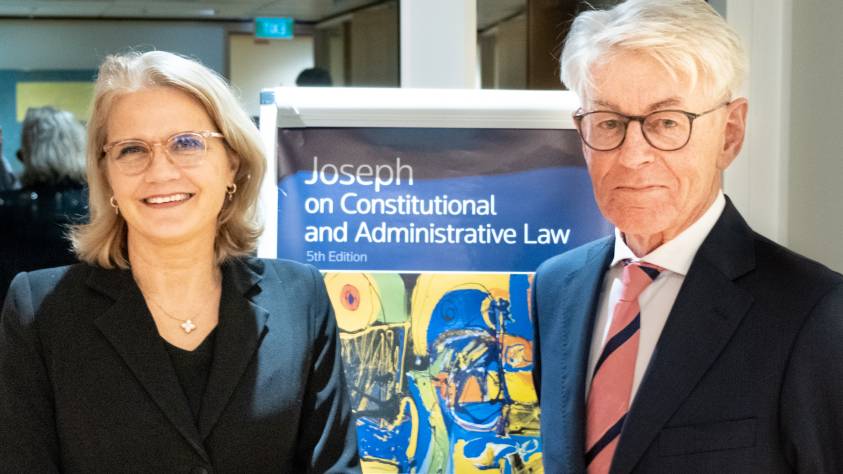The opportunity to launch a book in person is an event that we now don’t take for granted. For the launch of the fifth edition of Joseph on Constitutional and Administrative Law, it was a chance to celebrate the evolution of a text that reflects the changing landscape of New Zealand’s public law.
Professor Philip Joseph says, tongue in cheek, that a book launch is absolutely necessary. In fact, he’s had a launch for every edition.
And rightly so. This launch demonstrated the extent of the authority this book holds for not only New Zealand public law, but also the senior judiciary. The number of references to Professor Joseph’s series made by High Court, Court of Appeal and Supreme Court judgments are collectively in the hundreds, demonstrating the scope of influence his authorship has had in the 27 years of the book’s editions being published.
Dame Helen Winkelmann officially launched the fifth edition, commending the event as in important moment for New Zealand’s constitutional order. This was both for the importance of the text which captures and records the moments of New Zealand’s culture that hold constitutional significance, and the work of Professor Joseph himself, who began writing the first edition 30 years ago.
In her speech, the Chief Justice said, “Professor Joseph includes new material on the place of Tikanga Māori in our law and describes it as the foremost development in public law thinking since the previous edition.
“He notes the cultural shift that has taken place with the courts’ willingness to embrace tikanga and the bi-cultural principles on which New Zealand is founded. He reviews not only the development of the common law, but also scans across the impacts of tikanga on how law is being administered in our courts.”
The book’s coverage is so up to date that it addresses the Chief District Court Judge Heemi Taumaunu’s Te Ao Marama pilot announced late last year, which intends to evolve the District Court’s approach to justice to one that “partners with local iwi and local communities to design a solution that works for multi-cultural Aotearoa New Zealand.”
Professor Joseph’s fifth chapter, Tikanga Māori and the Law, is new to this edition. It covers the “legal pluralism” unique to New Zealand, defines tikanga, and discusses its cultural and legal renaissance via the critical perspectives that has been recently forwarded by Māori Indigenous Rights Theorists.
Chief Justice Winkelmann also regarded the book’s role in strengthening the many elements that make up New Zealand’s constitution by and gathering them in an articulated constitutional history.
“Our constitutional arrangements are properly described as complex and opaque, and because of that, fragile. The clarity this book brings to those arrangements, and the comprehensive way in which it addresses them, is invaluable to those who swim in Constitutional waters.”
Thomson Reuters has had a hand in developing the series of editions. A significant and justified change for this edition is including Philip’s surname in the edition’s title, cementing the authority he holds on the area of constitutional and administrative law.
The launch, Philip says, is another way his appreciation for his relationship with the publisher can be shown. Producing such an in-depth text takes quite an amount of time, as well as a healthy dose of legal consideration. “When its finished, its finished, so when I turned over page fifteen-hundred and something and there was nothing there, that was when it was finished!”
As New Zealand’s constitutional history continues to evolve, we will be sure to see a sixth edition.

